
This year marks the 20th and biggest edition of the Quacquarelli Symonds (QS) World University Rankings which was initially launched back in 2004. The 2024 chart features 1500 universities and institutions from 104 countries and territories. In addition to that, QS ranking methodology has witnessed changes to the number of indicators and their various weights this year.
The Top 10
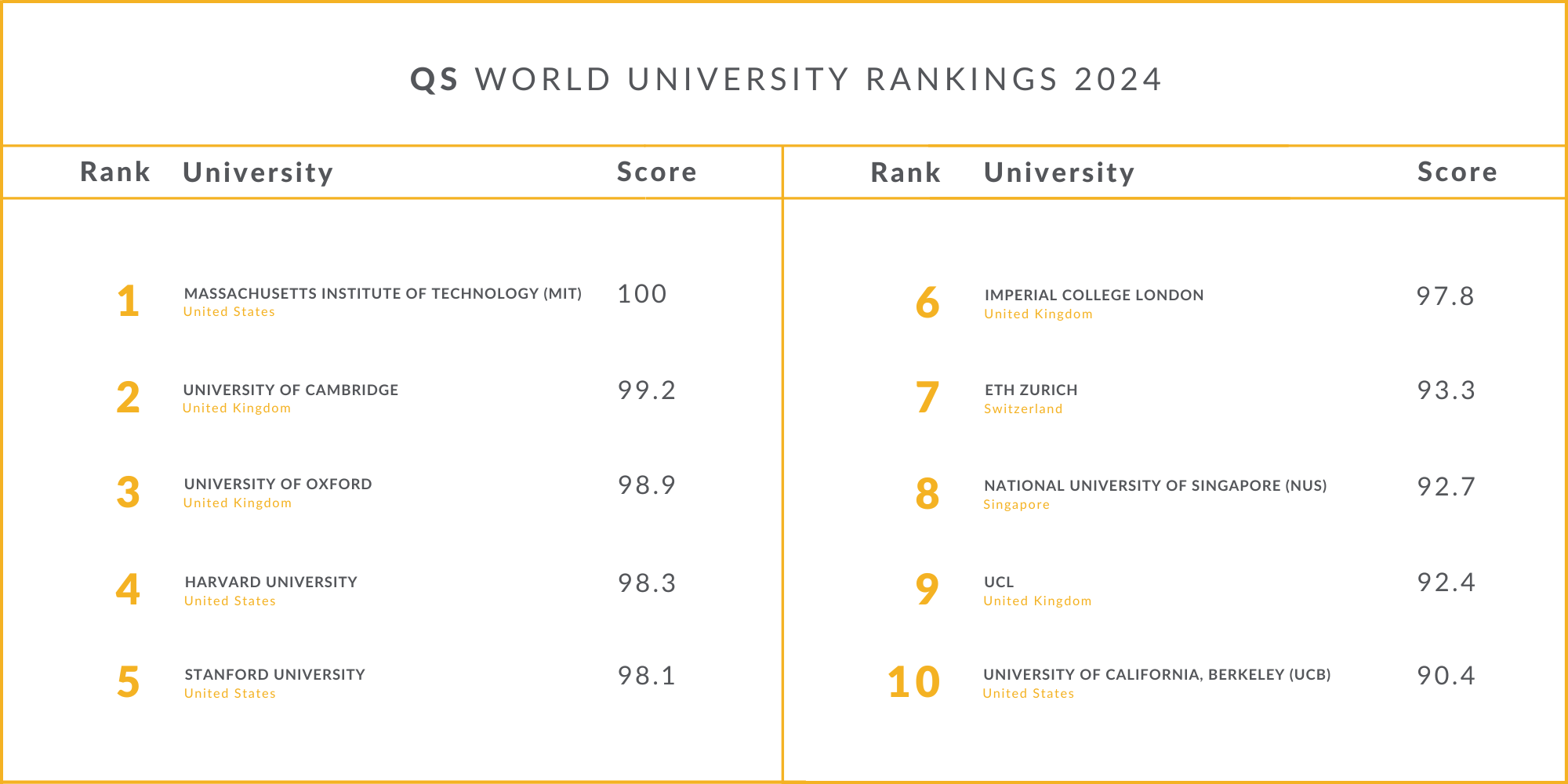
From the United States, Massachusetts Institute of Technology (MIT) occupies the first spot for the 12th year. University of Cambridge hangs on to the second place for another consecutive year, with an improved score of 99.2 compared to 98.8 last year. University of Oxford takes over third place, up from fourth in the QS 2023 charts. Harvard University rose a rank to fourth place this year, whereas Stanford University dropped a couple of spots to fifth place. While California Institute of Technology (Caltech) and University of Chicago both slipped out of the top 10 for 2024, Imperial College London maintained its rank in sixth place.
In seventh place, ETH Zurich improved its score and jumped two spots from ninth place last year. Perhaps one of the most noteworthy improvements within the charts this year is National Institute of Singapore which rose to eighth spot after having occupied 11th place for the past five years. Meanwhile, UCL dropped a rank from eighth last year. Finally, another striking improvement among the top 10 was achieved by University of California, Berkeley (UCB) which earned its rank in 10th position this year, an impressive 17 ranks up from 27th the year before.
New Methodoly
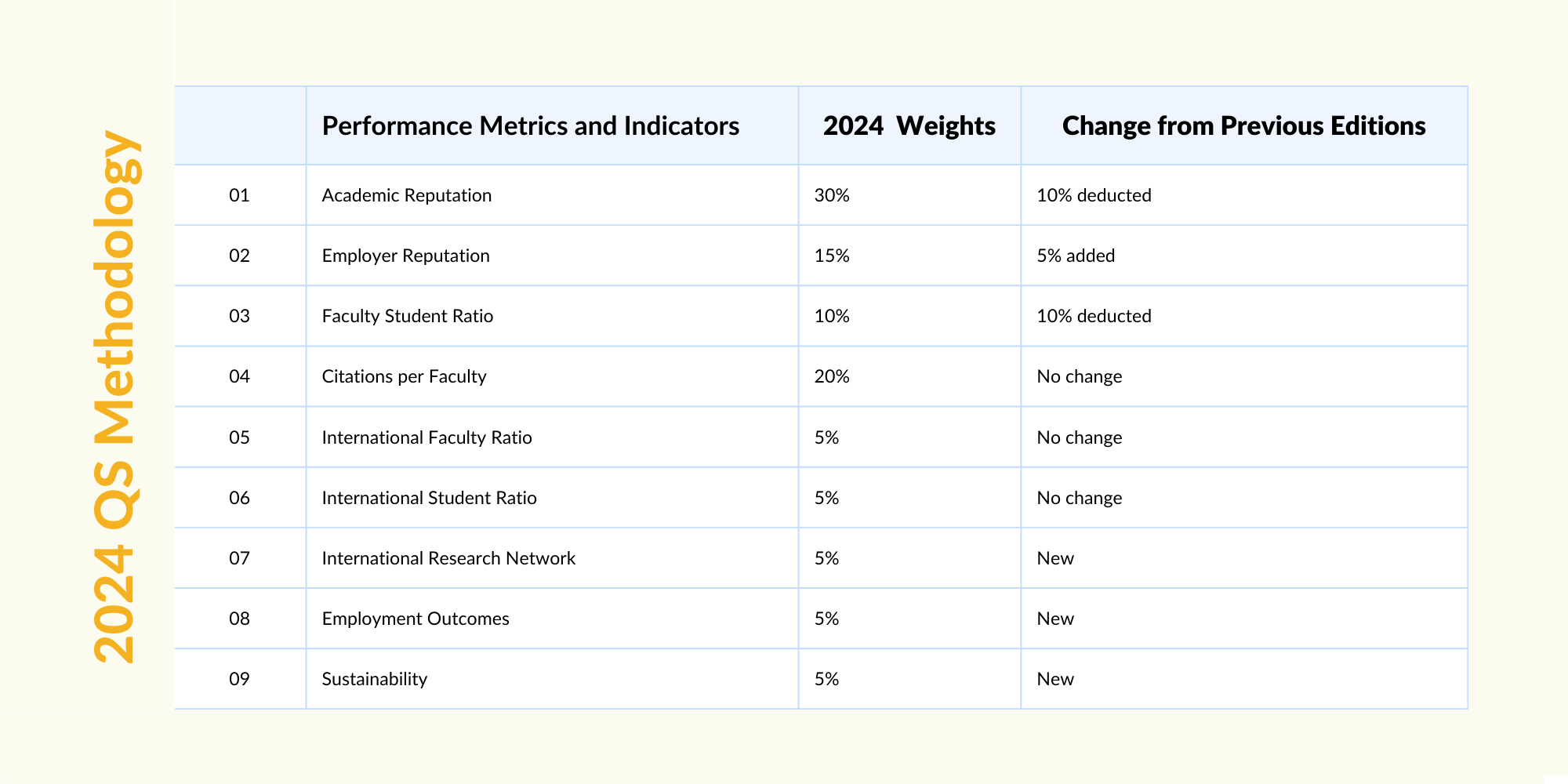
The QS World University chart results are based on 17.5 million scholarly research papers and the expert opinion of more than 240 thousand academic faculty and employers. In addition to that, this year marks the largest methodology changes to-date. QS has recently introduced three new metrics: International Research Network, Employment Outcomes, and Sustainability – each of which have a weight of 5% out of the total score for each institution.
A recent QS survey shows that 90% of institutions believe that the sector needs to become more sustainable, and 70% believe that adding the new metric – Sustainability, will encourage universities to become more socially and environmentally active. In a new interview with the founder and president of Quacquarelli Symonds, Nunzio Quacquarelli, he stated:
“While we have always tried to remain consistent in our methodology, we must also evolve to reflect the changing missions of universities. We recognise that the global student community we serve understand the significance of the climate crisis and see a real responsibility among universities in supporting the sustainability agenda.”
As for the two new remaining metrics, Employment Outcomes and International Research Network, QS considers that recognising both, the importance of employability and the significant potential of collaborative research, is becoming increasingly crucial in today’s world.
Fastest Risers and New Entrants
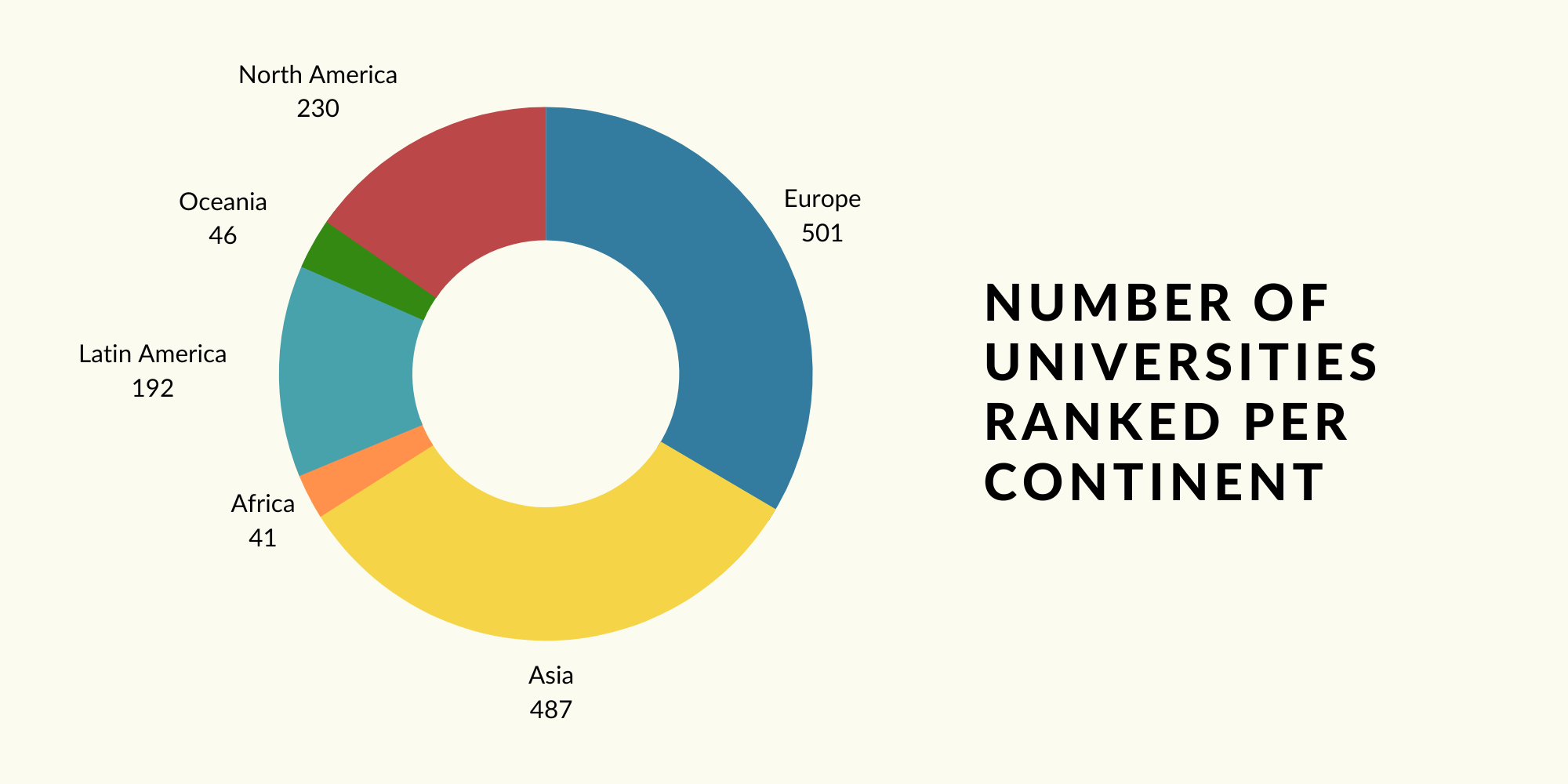
Out of the 85 new entrants this year, the majority are from Asia. Among the fastest rising countries in Asia are Bangladesh, with 11 new institutions ranked, and Indonesia, with 10 institutions. Moreover, India and Malaysia each witnessed five new institutions being ranked for the first time this year.
Four new countries were featured on this year’s charts: Ethiopia, Iceland, Luxemburg, and Nigeria. From the Arab world, the performance of Hamad bin Khalifa University from Qatar was particularly impressive, securing a place within the top 400 as a new entrant.
On a more global level, nine more African institutions were ranked in the 2024 charts. Similarly, Asia had an additional 48 institutions on this year’s charts; Europe, 18; and Latin America, two. And finally, Oceania retained the same number of higher education institutions as last year on this year’s table while North America lost two spots compared to last year.
Top 10 According to the Sustainability Metric
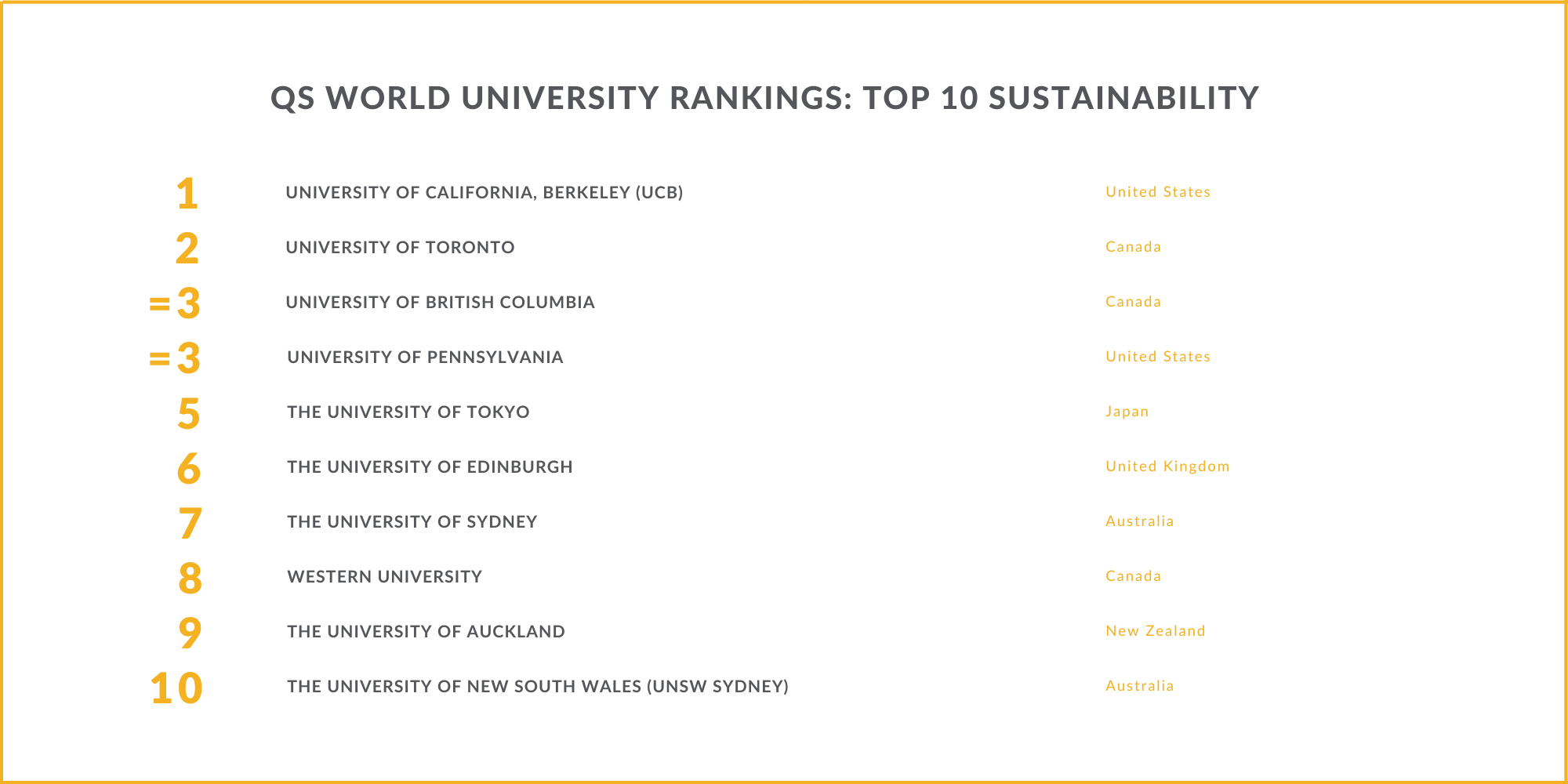
North American institutions topped the Sustainability chart this year with The University of Tokyo from Japan following close by in fifth place. While institutions from the United States, Canada, Japan, the United Kingdom, Australia, and New Zealand populated the top 10, many universities from Sweden performed remarkably well, including Uppsala University and Lund University which made it to 12th and 13th place, respectively.
Adding this metric to the World University Rankings is one way in which QS is demonstrating, not only its commitment to sustainable development, but also its acknowledgement of those institutions which are striving to make a change, socially, environmentally, or both.
Within the Arab World
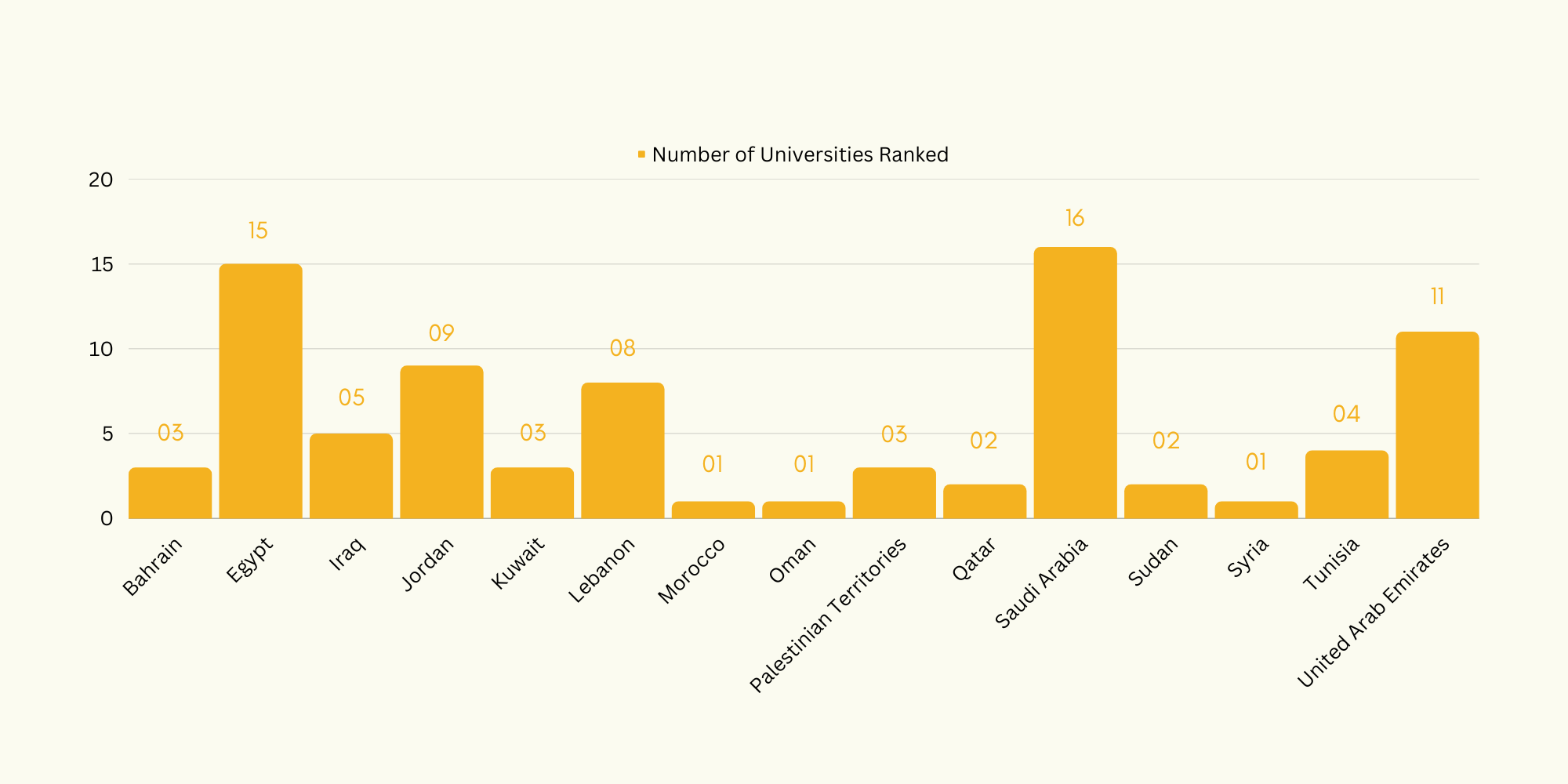
A total of 84 Arab universities were ranked in the 2024 edition of the QS World University Rankings compared to 80 last year. The most represented countries from the region were: Saudi Arabia, with 16 institutions ranked; Egypt (15), the United Arab Emirates (11), Jordan (9), and Lebanon (8). Those same countries, with the addition of Qatar and Oman, were the countries whose institutions made it into the top 500.
Below is the list of Arab universities within the top 500:
– King Abdulaziz University, Saudi Arabia – Rank: 143
– Qatar University, Qatar – Rank: 173
– King Fahd University of Petroleum & Minerals, Saudi Arabia – Rank: 180
– King Saud University, Saudi Arabia – Rank: 203
– American University of Beirut (AUB), Lebanon – Rank: 226
– Khalifa University, United Arab Emirates – Rank: 230
– United Arab Emirates University (UAEU), United Arab Emirates – Rank: 290
– Hamad Bin Khalifa University, Qatar – Rank: 310
– American University of Sharjah, United Arab Emirates – Rank: 364
– Cairo University, Egypt – Rank: 371
– The American University in Cairo, Egypt – Rank: 415
– Sultan Qaboos, Oman – Rank: 454
– University of Sharjah, United Arab Emirates – Rank:465
– University of Jordan, Jordan – Rank: 498
Sources:
Forge world-class universities
Assess, develop, and implement strategies to improve your institution’s leadership excellence and aid global reputation ambitions with our training and consulting programmes. Click below for more information.



